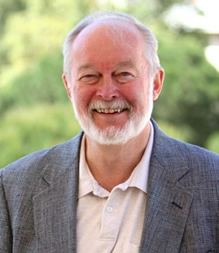2015-2016 Baylor Lecture Series in Mathematics
Donald G. Saari
Professor Donald G. Saari gave the ninth annual talks in the Baylor Lecture Series in Mathematics when he visited Baylor from October 7-10, 2015. Dr. Saari is a Distinguished Professor at the University of California - Irvine, where he holds three professorial positions in the Department of Economics, the Department of Mathematics and in the Department of Logic and Philosophy of Science. Presently, Dr. Saari is the Director of the Institute for Mathematical Behavioral Sciences at UC-Irvine and is also the Arthur and Gladys Pancoe Professor Emeritus of Mathematics at Northwestern University.
Prior to joining UC-Irvine in 2000, Professor Saari was a member of the faculty at Northwestern University. Hailing from the Upper Peninsula of Michigan, he was an undergraduate student at Michigan Technological University in Hougton, Michigan. He then did his graduate work in mathematics at Purdue University, where he was a student of Harry Pollard, one of the foremost experts in the world on Celestial Mechanics. After earning his Ph.D. from Purdue in 1967, Dr. Saari was post doc at Yale University in their Department of Astronomy. He joined the Department of Mathematics at Northwestern University in 1968 and rose through the ranks to Full Professor in 1974; he remained at Northwestern until 2000 when he moved to UC-Irvine.
Dr. Saari has earned several honors and won several awards for his research. In 2001, he was elected to the US National Academy of Sciences. He is also a member of the American Academy of Arts and Sciences (2004) and the American Association for the Advancement of Science (2001). He was a Guggenheim Fellow from 1988-1989. He is a Fellow for both the Society of Industrial and Applied Mathematics and the Society for Advancement of Economic Theory. He holds Honorary Doctorates from Purdue University, Universitè of Caen (France), Michigan Technical University and the University of Turku (Finland). Dr. Saari has also been awarded the Lester R. Ford Award (for his article "Newton’s Method, circle maps and chaotic motion"), the Chauvenet Prize (for his article "A Visit to the Newtonian N-body Problem via elementary complex variables") and the Carl B. Allendoerfer Award (for his article "Geometry, Voting and Paradoxes"). Among his many editorial duties for various journals in analysis, dynamics, economics and decision analysis, Dr. Saari is Chief Editor of the Bulletin of the American Mathematical Society.
Professor Saari’s earlier research centered on dynamical issues such as the evolution of the universe. It was through this work that led him to studying dynamical issues in the social sciences. To date, he has published, in addition to ten books, more than 200 papers in the areas of dynamical systems, celestial mechanics, mathematical economics, decision analysis and voting theory. He is particularly known now as an expert on the mathematics of voting. Indeed, he is the author of three books on this subject: "Chaotic Elections", "Decisions and Elections", and "Disposing Dictators, Demystifying Voting Paradoxes". In addition, he is the author of the popular, book "The Way It Was", an important account describing the early years of the American Mathematical Society.
The titles, and abstracts, for his two lectures were:
Thursday, October 8, 2015 at 4:00 pm - Baylor Sciences Building D109
PUBLIC LECTURE: From Voting Paradoxes to the Search for 'Dark Matter'
Abstract: There are so many delightful mysteries that range from everyday life to science. It is, for instance, election season: will the candidates the voters want really be elected? Paradoxical behavior indicates this need not be the case. Why? And then there is that deep, dark mystery of "dark matter", which seemingly, occupies most of the mass of a galaxy -- even though we "know" precisely where it should be, we cannot see or find it. Only through the power of mathematics can these mysteries be connected. Expect to be surprised with this expository lecture.
Friday, October 9, 2015 at 4:00 pm - MMSCI 301
Mathematics of Astronomy
Abstract: Newton and his equations of motion: They have provided mathematical mysteries for centuries. This lecture will expand upon the 'dark matter' material of my public lecture while indicating the evolution of the universe and other mysteries.
